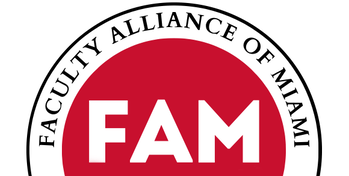[Note: This post was mistakenly left unposted in late October 28, 2020. We are posting it now for the record. We are grateful to faculty for turning out in such numbers to support and vote for the Faculty Assembly Resolution, which passed at the end of fall semester.]
Is Senate advice — advice that represents the considered opinions and interests of faculty and other employees — being adequately communicated to and considered by Miami’s Board of Trustees? We believe it is not.
Exhibit A:
On Monday, October 26, 2020 at the end of Senate, after the meeting adjourned, Provost Jason Osborne made some comments about the recently revised and controversial furlough policy.* Here is a recording of his comments that includes a question from Senator Cathy Wagner (president of Miami AAUP).
In his comments, the Provost first explained to Senate something Senators already know very well, which is that Senate’s role is merely advisory (by Ohio law, the Board has the final say over all policies, though it delegates some powers to Senate and administrators).
The provost then told Senate that even though the Board had rejected Senate’s advice on the furlough policy, Board members had had a robust discussion and debate about our advice and had been very attentive to faculty concerns and welfare.
But Cathy Wagner, along with at least two other faculty members, had attended the Board meeting at which the policy was voted on (the Finance & Audit Committee Meeting). The faculty heard no discussion of the policy, and did not hear faculty or student welfare discussed at all. What the faculty heard was the General Counsel putting forward a version of the policy that did not include Senate’s advice to limit unlimited furloughs to one year; Dr. Creamer speaking in support; and a vote by Board members without any discussion.
So, at the Senate meeting, Wagner asked the Provost to clarify when the robust discussion he described had taken place.
The Provost was not able to clarify when the Board discussion about the policy took place.
Luckily, there are minutes available from Board meetings. Where there was discussion, the minutes do record it. For instance, there was a short discussion at the Finance and Audit Committee meeting about Miami’s debt. The minutes mention it and the faculty in attendance did hear that discussion.
But the Board minutes do not support the Provost’s assertion that there was robust discussion of Senate recommendations and faculty needs by the Board of Trustees. Here are the passages from the minutes that regard the furlough policy — first, the report from the Finance and Audit committee chair, and second, the record of the adoption of the revised policy.


It is possible that a robust discussion about the furlough policy took place in an informal venue, but the Board meetings took place on Zoom and there were thus no opportunities for casual conversation over dinner or coffee.
The Faculty Assembly Resolution‘s proposal to add 2 nonvoting faculty members to the Board of Trustees will heal rifts and build trust by improving transparency and communication at Miami.
If faculty want transparency, honesty, accountability, and genuine shared governance, we will need to stand together and demand it. Please come to the Faculty Assembly on November 5 at 4:15pm and stand up for faculty rights by voting for the resolution — petitioned for by over 100 colleagues — on Shared Governance and Budget Transparency.
*Miami’s furlough policy change has been controversial. General Counsel Parker brought Senate a new version of the policy that revised it from 20 days to unlimited days. Parker said that most universities in Ohio had unlimited furlough days. This was not accurate.
Parker also offered no financial justification for the need for the change; she simply said that the university needed more flexibility. Senate advised that, given the current financial difficulties, it was willing to support the change even without being shown financial data. However, Senate specified that the change to unlimited days should last only for a year, after which the policy would be revisited.
But the revised policy Parker presented to the board permanently changed the policy. That is, from now on, it will be possible to put employees on unlimited furlough. The recent decision to furlough Athletics employees despite the fact that there has been no overall operating budget deficit at the university shows the danger of this policy to employees: it can be invoked for reasons apart from genuine financial exigency.
Nevertheless, the board supported her recommendation without discussion.

Leave a Reply